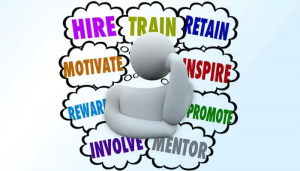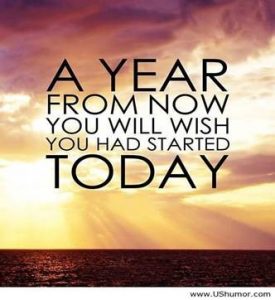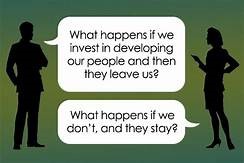Leading In A VUCA World
 There’s no doubt about it, we’re living in a VUCA world. Although it sounds like something out of a science-fiction movie, VUCA stands for volatility, uncertainty, complexity and ambiguity. And it’s become even more pronounced over the past few years. What’s also becoming clear is that strong management within organizations is more vital than ever and comfortable, classic models of leadership don’t work within our ever-changing climate.
There’s no doubt about it, we’re living in a VUCA world. Although it sounds like something out of a science-fiction movie, VUCA stands for volatility, uncertainty, complexity and ambiguity. And it’s become even more pronounced over the past few years. What’s also becoming clear is that strong management within organizations is more vital than ever and comfortable, classic models of leadership don’t work within our ever-changing climate.
So, what does it take to lead in a VUCA world? It takes a lot of effort, but here are some of the top ways to navigate the waters:
- Developing shared purpose and communicating it effectively: Leaders need to be skilled at building teams that have a shared vision. They must also be adept at helping team members understand their place within the big picture. Communication is key!
- Learning to move out of a comfort zone: The old ways of doing things may have worked in the past, but it doesn’t mean they’re going to work forever. Leaders must be open to change and embrace a fresh and creative approach to tackling challenges.
- Having the confidence to lead through times of uncertainty: Times of change can be difficult to handle and managers feel it as much as their team members (maybe even more!). However, strong leaders must be able to assess available information, risks, etc. and take strong, confident action based on their knowledge.
- Providing consistent support: This includes: mentoring team members to help them adjust to changes, modeling the desired behavior for embracing changes, providing and supporting employee learning and development and acknowledging and celebrating successes!
In today’s constantly changing world, leaders may feel like they need to step up their game to be as effective as possible. However, it can be intimidating
to take the first steps towards meaningful and sustainable action. Leaders don’t have to go it alone. Working with a coach, like Leah M Joppy and Associates, provides managers with a partner that can help them navigate our VUCA world. We work with leaders to develop the competencies outlined above and to survive and thrive in a VUCA climate. We also help leaders develop high levels of resiliency, so they’re ready to take on challenges and are less likely to experience burnout.
Call Leah M Joppy and Associates at 301-670-0051 or email leah@lmja.com to learn how we can help.
A Word For An Unsettled Environment
 Chances are, you’ve probably heard or read the acronym ‘VUCA’ (Volatility, Uncertainty, Complexity, Ambiguity) thrown around a time or two. It’s one of those buzz-worthy terms to describe the unsettled environment organizations have to deal with on a daily basis. And nothing has brought out VUCA more than the past few years, as organizations have dealt with unprecedented changes in day-to-day operations and had to pivot in unexpected ways.
Chances are, you’ve probably heard or read the acronym ‘VUCA’ (Volatility, Uncertainty, Complexity, Ambiguity) thrown around a time or two. It’s one of those buzz-worthy terms to describe the unsettled environment organizations have to deal with on a daily basis. And nothing has brought out VUCA more than the past few years, as organizations have dealt with unprecedented changes in day-to-day operations and had to pivot in unexpected ways.
The acronym ‘VUCA’ was first used in 1987 by the U.S Army War College to describe the unfortunate situation after the Cold War. The term later found its way into the business world and outlines four distinct challenges that leaders face:
Volatility: Challenges are unstable and unexpected. The duration of these challenges is unknown.
Uncertainty: The future is unpredictable. It’s nearly impossible to anticipate events and how they’ll unfold.
Complexity: Information is overwhelming and choosing a single right path is almost impossible. Challenges and their repercussions are more complex and harder to understand.
Ambiguity: Situations are vague and difficult to interpret.
In short, we’re living in a world that’s constantly changing and these changes, whether big or small, are happening faster and faster and in more unpredictable ways. Since we don’t have a crystal ball to see the future, the best way for an organization to be prepared is through strong leadership. As we saw over the past few years, change can be incredibly challenging for team members with people reacting to these changes in different ways. Skilled, prepared leaders are the key to meeting the challenges of VUCA head-on through:
- Maintaining strong lines of communication
- Keeping employees engaged
- Determining fresh and creative approaches to meet changes head-on
- Maintaining and growing productivity
And that’s just the start. It’s a tall order for even the most seasoned leader and one where they’ll need a strong level of support from upper management.
As much as we’d like to make time stand still for a bit and catch our breath, change and the challenges that accompany it, is inevitable. We don’t know exactly what changes are coming down the road, but working with a coach, like Leah M Joppy and Associates, can help your organization be prepared when they do happen. We can take a look at what challenges your organization has faced in the past, how your leadership team handled them, what worked and what didn’t. We can then work with you to improve approaches and develop creative and flexible solutions that will help make this VUCA world we’re living in a little more manageable.
Interested in learning more? Call us at 301-670-0051 or email leah@lmja.com.
Keeping Your Managers In Place
 When it comes to workplace satisfaction, employees continually rate “strong leadership” among one of the most important factors. Your management team is an integral part of your organization, but are you doing everything you can to support them and ensure that they have the necessary tools to lead effectively? In our last article, we looked at a few of the reasons why managers leave their jobs for other opportunities. What can organizations do to reduce turnover among managerial positions and keep current managers engaged? Here’s a look at a few suggestions:
When it comes to workplace satisfaction, employees continually rate “strong leadership” among one of the most important factors. Your management team is an integral part of your organization, but are you doing everything you can to support them and ensure that they have the necessary tools to lead effectively? In our last article, we looked at a few of the reasons why managers leave their jobs for other opportunities. What can organizations do to reduce turnover among managerial positions and keep current managers engaged? Here’s a look at a few suggestions:
- Provide adequate training: Some people are born leaders, but most need training and support when they’re in a managerial role. However, managers are often last in line when it comes to training and development. And it’s one of the biggest mistakes organizations can make. There are all kinds of beneficial training for managers, from honing their soft skills to methods for delegating more effectively and increasing productivity, to name a few.
- Monitor stress: The past few years have been particularly stressful for workers and managers are no exception. They’ve probably been trying to manage the anxiety and stress within their team, but they also need someone in their corner. Regular check-ins, encouraging open and honest feedback and providing flexibility to create work/life balance can really go a long way.
- Give regular feedback and praise: Consistent conversations about performance need to take place at all levels of an organization and that includes managers. Give praise where praise is due and provide constructive feedback on areas that could use improvement. Make sure managers are in the loop about future plans, so they understand where to place their priorities.
- Have regular career conversations: Managers who see opportunities for progression and a career path are more likely to be happy and engaged. If you can show them how their role might develop over time, they will continue to bring enthusiasm to the job.
If it sounds like a lot, don’t worry. That’s where working with a coach, like Leah M Joppy and Associates, can really help. We get to know your organization, your management team and help develop a plan to combat any issues head-on. We can also help develop training programs that tackle a variety of subjects.
Leah M Joppy and Associates is ready to work with your managers to not only increase job satisfaction, but ensure they feel supported in their role. It’s an investment that will pay off in increased loyalty and lower turnover. Call us at 301-670-0051 or email leah@lmja.com to learn how we can help.
In These Times, Can We Even Plan Ahead?
 With all the variables in the world today, it can seem like your agency or association is in a constant state of flux. Without the aid of a crystal ball, it may seem like planning for the future is an exercise in futility. Organizations may be tempted to wait and see what happens during times of uncertainty. But all of these unknowns shouldn’t keep you from looking ahead. In fact, failing to plan is a huge mistake for so many reasons.
With all the variables in the world today, it can seem like your agency or association is in a constant state of flux. Without the aid of a crystal ball, it may seem like planning for the future is an exercise in futility. Organizations may be tempted to wait and see what happens during times of uncertainty. But all of these unknowns shouldn’t keep you from looking ahead. In fact, failing to plan is a huge mistake for so many reasons.
In uncertain times, it’s the most resilient organizations that succeed. Part of that resilience is looking ahead as best you can and planning no matter what the future may hold. Here are a few important questions to consider as you develop a strategic plan:
- What do we know about the current environment in which we’re working?
- What hasn’t changed? What can we predict with some level of certainty?
- What do we need to prepare or plan for ‘just in case’?
- Has anything about the current environment caused us to reconsider or change our mission and/or values?
- What is our action plan for the next year? What are our objectives, timelines, budget to work with, etc?
Of course, the key to navigating times of uncertainty is developing a strategy with flexibility. But instead of hoping for the best, you at least have a plan that gives you and your team some sense of a forward-moving mission.
No matter what direction your agency or association takes in the months ahead, everyone has areas that can be strengthened with a little help, probing and encouragement. That’s where Leah M Joppy and Associates can help. We help you take control of your future by developing an action plan that positions you to succeed, no matter what the coming months may bring. Call us at 301-670-0051 or email leah@lmja.com to learn more.
Write Your Own Story
 So many of us are weary from the events of the last few years. Whether it’s a job loss, difficulties maneuvering the work from home/family life balance or the disappointment and loneliness that have accompanied the pandemic, we each have our own story about how these past few years have affected us. By now, everyone has a list of things they once took for granted but now miss or things they’ve grown to love during the period of staying at home.
So many of us are weary from the events of the last few years. Whether it’s a job loss, difficulties maneuvering the work from home/family life balance or the disappointment and loneliness that have accompanied the pandemic, we each have our own story about how these past few years have affected us. By now, everyone has a list of things they once took for granted but now miss or things they’ve grown to love during the period of staying at home.
According to a survey conducted by the National Research Group, approximately 90% of Americans say that the past few years have been a “good time to reflect on what’s important to them.” There’s also a renewed appreciation for “chatting” with our family and friends, as roughly 72% say our experience with the pandemic will have a positive impact on how we communicate in the future. And there’s newfound respect for a sometimes overlooked and underappreciated workforce in our country: grocery store workers, health care professionals, emergency responders – anyone we rely on for everyday life.
These are not small things, but rather a huge shift in how we view what’s important to us and how we spend our time. Perhaps family dinners and new traditions have become an area of focus. Others may have started a new health and wellness routine they’ve been putting off for years. And some people may have reduced the amount of material possessions in their homes, developed a new hobby or worked on learning a new professional skill. Whatever your story, these new priorities and insights truly matter!
When and if things begin to settle down, will you return to your old ways? Will you again focus on working crazy hours, money, material things or other areas of your life that were lacking in fulfillment? The big question is, what do you do with this appreciation of what really matters in life and make sure it continues after the world returns to “normal-ish”. Working with a coach is an ideal way to develop a plan with attainable goals, as well as have someone who will hold you accountable and keep you on track. Think of a coach as a partner for your future!
This past years have been far from easy. There’s been irritability, frustration, anger, and a major dose of cabin fever. But perhaps years from now, we’ll look back on it as an unexpected opportunity to really tune into what matters most in our lives and use that knowledge to create meaningful change. Whether these goals are personal or career-related, Leah M Joppy and Associates can work with you to bring them to fruition. Call us at 301-670-0051 or email leah@lmja.com to learn more.
PLANNING FOR THE NEW YEAR
 What a long, strange ride it has been in the last few years! If the last few years have taught us one major lesson, it’s that plans can get derailed and we must be willing to adapt. They’ve also given us an opportunity to assess our way of doing business within a new framework. For example, what are some of the biggest lessons you’ve learned this past year? What are some of the biggest challenges facing your organization over the next year and beyond? What are your strengths and weaknesses to meet those challenges?
What a long, strange ride it has been in the last few years! If the last few years have taught us one major lesson, it’s that plans can get derailed and we must be willing to adapt. They’ve also given us an opportunity to assess our way of doing business within a new framework. For example, what are some of the biggest lessons you’ve learned this past year? What are some of the biggest challenges facing your organization over the next year and beyond? What are your strengths and weaknesses to meet those challenges?
You may have already developed a strategic plan for the year, but if we’ve learned anything, it’s that plans can change quickly. That’s why it’s important to consider the following when drafting a plan for the next year:
- Embrace Reality: While we’re all ready for the pandemic to be over, we’re still going to be doing business differently for a while. You may want to keep some of the changes you made over the past year. Or based on what you’ve learned over the past several months, you may need to make additional plans based on existing conditions.
- Be Adaptable: Organizations that were able to pivot quickly when the pandemic began experienced less impact than those who struggled through the process. Flexible processes and adaptable strategies are your best course of action if things worsen before they improve.
- Make Your People A Top Priority: People are the core of your department and now, more than ever, you need to take care of them. This includes physical and mental health, as well as work-life balance. With so many people working from home, communication should be a priority. What’s worked well over the past several months? What areas could use improvement?
- Plan For The Unusual: A long-term strategy that includes various scenarios helps you navigate challenges. For example, additional equipment and tools for remote workers, plans for employees who may be out due to the coronavirus and workers who need flexibility due to school closures are all issues to consider.
Planning in advance is one way effective leaders avoid the stress of falling behind, particularly during times of uncertainty. Leah M. Joppy and Associates has worked with numerous firms to draft annual plans that align and inspire teams to reach their goals for the coming year – and beyond. Then we help you put it all into action. For more information, contact us at 301-670-0051 or email leah@lmja.com.
Re-imagining How Work Is Done
 When we think about how our lives have changed over the past year, our work life is probably one area where we’ve felt the greatest impact. The pandemic forced many offices to adopt new ways of working in order to protect the safety and wellbeing of employees – and they had to do it virtually overnight. For many people, it meant working from home exclusively and the numbers prove it. According to a Gallup Poll, the percentage of Americans working in some form from home jumped from around 25% to more than 60% during the height of the pandemic. As more people are fully vaccinated and life begins to return to some sense of normalcy, many employees have started to return to the office. However, the future of traditional work life and workspace will likely be impacted for the foreseeable future.
When we think about how our lives have changed over the past year, our work life is probably one area where we’ve felt the greatest impact. The pandemic forced many offices to adopt new ways of working in order to protect the safety and wellbeing of employees – and they had to do it virtually overnight. For many people, it meant working from home exclusively and the numbers prove it. According to a Gallup Poll, the percentage of Americans working in some form from home jumped from around 25% to more than 60% during the height of the pandemic. As more people are fully vaccinated and life begins to return to some sense of normalcy, many employees have started to return to the office. However, the future of traditional work life and workspace will likely be impacted for the foreseeable future.
Some employees are eager to return to the office and have face-to-face contact with others and enjoy post-work happy hours. Others have adjusted to working from home and don’t miss their long commute. Companies are realizing that there are advantages to both work from home and office time. That’s why the hybrid model where employees can work at least a few days from home may likely become the new norm. It’s one of several workplace trends that we’ll discuss in the next article.
There are a lot of questions businesses must answer about the role of the office moving forward. It differs across industries and there is no one-size-fits all approach. However, there are some universal steps organizations need to take to re-imagine how work is done:
- Decide how and where people work: Can some workers be fully remote? Does a hybrid remote model make more sense? Or does work need to take place on site?
- Redesign the workplace to correspond with company priorities: Looking at spacing issues between desks, meeting space, the airflow of the office and upgrading technology to collaborate with people working from home are just a few areas to consider.
- Look at the footprint of the office and resize creatively: Now is the time to take a fresh look at how much space is required and the location.
Across industries, leaders will use the lessons learned from the pandemic to reimagine how and where work gets done. Employees will demand it. Organizations must use this time to break from the old habits of the past and reinvent what a collaborative and productive work environment looks like moving forward. Creative and bold organizations will be the ones that meet the challenge and retain and attract employees.
Is your organization poised to make challenging workplace decisions that will create a better experience for your employees? Leah M Joppy and Associates is ready to help. Call us at 301-670-0051 or email leah@lmja.com to learn more.
Coaching For Mid-Level Managers
 Middle managers are often dealt a difficult hand. They’re expected to play the dual role of both boss and employee and the balancing act that accompanies this type of position can be tricky to navigate. If you’re in a middle management position, you’re probably required to deal with day-to-day issues and complaints from your employees, while also understanding and implementing big picture goals from upper management. It can really make you feel like you’re caught in the “middle”!
Middle managers are often dealt a difficult hand. They’re expected to play the dual role of both boss and employee and the balancing act that accompanies this type of position can be tricky to navigate. If you’re in a middle management position, you’re probably required to deal with day-to-day issues and complaints from your employees, while also understanding and implementing big picture goals from upper management. It can really make you feel like you’re caught in the “middle”!
Many middle managers can feel like they’re thrown to the wolves, particularly if they were promoted to the position with little to no training. Mid-level managers must build their soft skills in addition to so many others. Here are a few skills needed to be an effective mid-level manager:
- Proficiency in Hiring Top Talent
- Excellent Communication Skills
- Strong Delegation Skills:
- Collaboration Skills
- Strong Decision-Making Skills
Working with a coach can really help with honing these skills. By assessing the unique challenges you face in a middle management position, a life coach can work with you on the best ways to tackle tough situations and develop a clear and detailed plan of action. You can also learn the best ways to advocate for yourself and what you need to perform effectively in your position. Best of all, a coach is someone who has your best interests at heart and is going to help you achieve that balancing act – both in and out of the office.
Whether you’re new to a mid-level management position or you’ve been in one for a while, it’s always beneficial to take a step back and examine what areas you’d like to work on both in and out of the office. If you’re ready to make some meaningful changes and looking for a life coach that can help you through it all, Leah M. Joppy and Associates is ready to help. Call us at 301-670-0051 or email us at leah@lmja.com.
EOY BUDGET NEEDS: POPULAR COURSES
 It’s been a long, strange year (to put it mildly!) and your team may be feeling the stress of working from home and isolation from the day-to-day routine of the office. It may feel more challenging than ever to communicate effectively with your staff and teamwork may be lacking right now. Or you may feel like you want to do strategic planning for the future, but it’s hard enough to just deal with daily tasks. LMJA has a number of courses that can help with the challenges you’re experiencing during the crazy year of 2020. Courses are now VIRTUAL.
It’s been a long, strange year (to put it mildly!) and your team may be feeling the stress of working from home and isolation from the day-to-day routine of the office. It may feel more challenging than ever to communicate effectively with your staff and teamwork may be lacking right now. Or you may feel like you want to do strategic planning for the future, but it’s hard enough to just deal with daily tasks. LMJA has a number of courses that can help with the challenges you’re experiencing during the crazy year of 2020. Courses are now VIRTUAL.
Here’s a look at four of our most popular courses and how they can be a great investment in your team. These courses can be tailored for a half-day session. Courses can also be spread out into 2 half-day sessions. A variety of self-awareness assessments are used in all of our courses.
- Effective Interpersonal Skills: Interpersonal skills are sometimes referred to as people skills, soft skills or emotional intelligence skills. Valuable interpersonal skills include: teamwork, leadership, empathy and active listening. In this course, we discuss verbal and non-verbal cues, why they matter and how to build strong interpersonal skills that will enhance both the harmony and productivity of your office.
- Conflict Management Skills: Problems can arise on any team and you will likely need to resolve conflict at some point in your job. Our course helps you develop conflict resolution skills, deal with constructive criticism and gain important counseling, mediating and problem-solving skills.
- Developing Inclusive Teams: While most managers believe having a diverse and inclusive work culture is critical to performance, they don’t always know the best ways to achieve that goal. Our course covers a broad range of topics, such as examining the culture of an organization, identifying current and potential problems and providing tools for change.
- Organizational Strategic Planning: Organizational strategic planning involves setting priorities, determining where to focus energy and resources, ensuring that employees are working towards common goals and much more. Our course helps you develop an effective strategic plan that clearly lays out where your organization is going, the actions needed to make progress and a blueprint for success.
If you are interested in making meaningful, long-lasting change in your department, Leah M. Joppy and Associates is ready to help. Call us at 301-670-0051 or email us at leah@lmja.com.
EOY BUDGET NEEDS: POPULAR COURSES
 If you’re examining your EOY budget and have last minute money that needs to be spent, now is an ideal time to invest those dollars in your team. Looking back on the last year, can you identify areas that need improvement? Perhaps there was a conflict that could have been resolved more effectively? Maybe communication is an area that needs improvement? Or maybe you just want a jumpstart on strategic planning for the next year and how that may look during the COVID-19 pandemic. Fortunately, LMJA has a number of courses that have changed the way offices communicate, operate and deal with issues.
If you’re examining your EOY budget and have last minute money that needs to be spent, now is an ideal time to invest those dollars in your team. Looking back on the last year, can you identify areas that need improvement? Perhaps there was a conflict that could have been resolved more effectively? Maybe communication is an area that needs improvement? Or maybe you just want a jumpstart on strategic planning for the next year and how that may look during the COVID-19 pandemic. Fortunately, LMJA has a number of courses that have changed the way offices communicate, operate and deal with issues.
Here’s a look at four of our most popular courses and how they can be a great investment in the most important part of your department – your people:
- Effective Interpersonal Skills: Interpersonal skills are sometimes referred to as people skills, soft skills or emotional intelligence skills. Valuable interpersonal skills include: teamwork, leadership, empathy and active listening. In this course, we discuss verbal and non-verbal cues, why they matter and how to build strong interpersonal skills that will enhance both the harmony and productivity of your office.
- Conflict Management Skills: Problems can arise on any team and you will likely need to resolve conflict at some point in your job. Our course helps you develop conflict resolution skills, deal with constructive criticism and gain important counseling, mediating and problem-solving skills.
- Developing Inclusive Teams: While most managers believe having a diverse and inclusive work culture is critical to performance, they don’t always know the best ways to achieve that goal. Our course covers a broad range of topics, such as examining the culture of an organization, identifying current and potential problems and providing tools for change.
- Organizational Strategic Planning: Organizational strategic planning involves setting priorities, determining where to focus energy and resources, ensuring that employees are working towards common goals and much more. Our course helps you develop an effective strategic plan that clearly lays out where your organization is going, the actions needed to make progress and a blueprint for success.
If you have money left in your EOY budget to spend and are interested in making meaningful, long-lasting change in your department, Leah M. Joppy and Associates is ready to help. Many of our courses have been reformatted to deliver in a virtual format. We also have a half-day course delivery option. Whether you’re a novice or a pro, our excellent course producer ensures a smooth delivery of our virtual courses. Call us at 301-670-0051 or email us at leah@lmja.com.